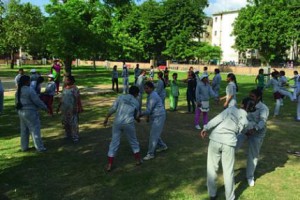Female manual scavengers get a ride into a new world
 New Delhi: After seven months of comprehensive training, around 400 women, who were earlier working as manual scavengers in Delhi, have procured their light motor vehicle driving licences and will soon be seen as smart cabbies zipping through the city roads driving Ola and Uber cabs.
New Delhi: After seven months of comprehensive training, around 400 women, who were earlier working as manual scavengers in Delhi, have procured their light motor vehicle driving licences and will soon be seen as smart cabbies zipping through the city roads driving Ola and Uber cabs.
The National Safai Karamchari Finance and Development Corporation (NSKFDC), which was tasked to train the women under the Swachchh Bharat Abhiyan in commercial driving, self-defence and soft skills, has already placed a few women as drivers in the city.
Rakhi, 20, whose family has been cleaning septic tanks for almost two generations, is all excited to step into her new role as a cab driver.
Until the time she gets her commercial licence, she has been temporarily employed by a young lawyer in Delhi. “This scheme has changed the way I look at life. I never thought I would become independent and have a respectable job. No one in my family has been in this profession. I feel very confident every day when I go to drop my boss,” says a beaming Rakhi.
Another girl, Luxmi, who is currently employed as a driver in a private home, feels empowered after she was coached and rehabilitated by the corporation. “Jab log gaadi chalate dikhte hain tab bahut achcha lagta hai. Ab mai apni life khud chalati hun. (It feels good to watch people drive. Now I drive my own life).”
But the journey of breaking free from their wretched jobs to one of respectability and empowerment hasn’t been an easy one for all these women. One of the young women, Sharda, who was trained at the Sangam Vihar camp, is still trying to get over her fear of trucks.
“I am still not confident enough. I start panicking when I see a truck coming towards me. I get so scared that in my first job I almost caused a collision. I was told to leave. But it is ok. I have all that I need. I will get another job soon,” says Sharda optimistically.
The mammoth task for the agencies working to rehabilitate these women is also to make sure that their families cooperate with them.
An official from the NSKFDC says that some of the parents refuse to allow their daughters to work. “We have a case wherein a girl was trained and was employed. But her family wanted her to get married, so she stopped reporting to us. I think it was a waste of talent. There is a need to educate the families on the importance of empowering these women.”
But for every girl who drops out, there are cases like that of Mamtha Sangte, who was once a manual scavenger and who broke the cycle of poverty in her family by becoming a martial arts trainer. The 34-year-old from Ujjain, who has a black belt in taekwondo, has been overseeing the self-defence training of the first batch of women at the camp set up by the NSKFDC.
There are also girls who have been driving e-rickshaws in the city. The NSKFDC has signed a MoU with Ola and Uber to make sure that these women get a hands-on experience of commercial driving. The training module for the two batches included soft skills and extensive training in basics of car mechanisms. The scheme seems to be bringing these girls closer to their dream.
The social justice ministry and the NSKFDC aim to train 10,000 such dalit women manual scavengers by 2019.
To begin with, for this project, women who are part of families involved in manual scavenging in Delhi were identified, and training camps were set up near their homes in areas like Rohini, Dwarka and Mangolpuri.
The Central government has planned to set up 70 such camps in other cities as well, for which 12,226 manual scavengers have been identified in 12 states across the country.
As a start, the Union social welfare ministry had released Rs 67.02 lakh for training and rehabilitation of 2,390 manual scavengers and their dependents.
Source: The Asian Age





